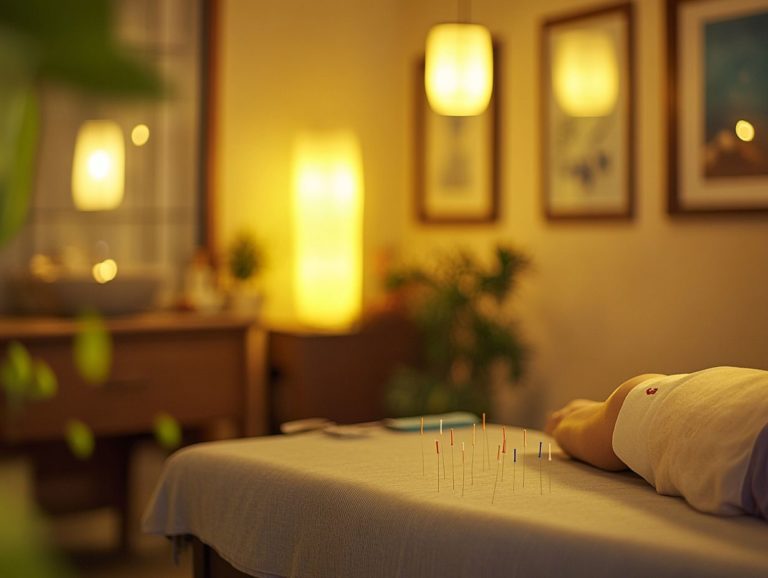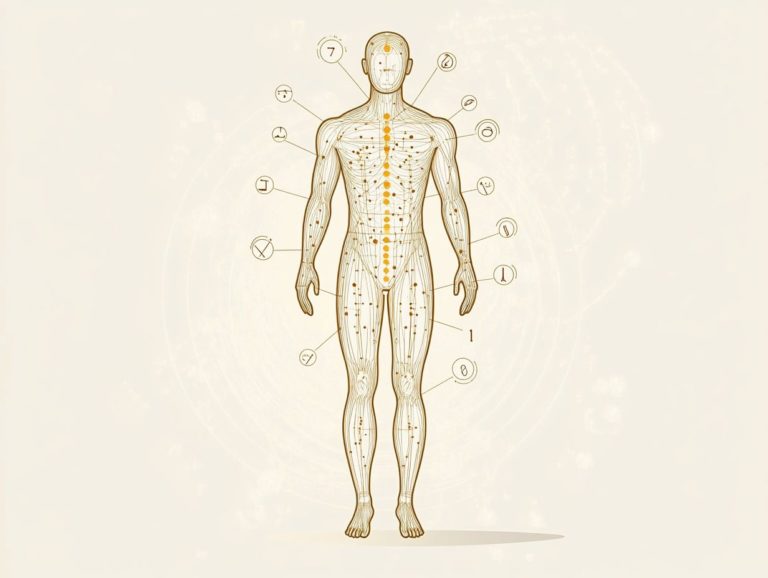Acupuncture for Headaches: Is It Right for You?
Acupuncture has become a sought-after natural remedy for various ailments, with headaches often at the forefront. You might be surprised to learn that this ancient practice, deeply rooted in traditional Chinese medicine, offers a distinctive approach to pain relief by focusing on specific points throughout your body.
In this exploration, you’ll dive into the rich history and fundamental principles of acupuncture. You’ll learn how it can effectively alleviate different types of headaches and what to expect during a session.
You will uncover the latest research, gain insights on selecting a qualified practitioner, and consider potential side effects.
Discover whether acupuncture could be the key to alleviating your headaches. Don’t wait any longer to find relief!
Contents
- Key Takeaways:
- Understanding Acupuncture
- How Acupuncture Can Help with Headaches
- What to Expect During an Acupuncture Session
- Research and Evidence on Acupuncture for Headaches
- Choosing an Acupuncturist
- Potential Side Effects and Risks
- Frequently Asked Questions
- What is acupuncture and how does it help with headaches?
- Is acupuncture safe for treating headaches?
- Can acupuncture cure all types of headaches?
- How long does an acupuncture session for headaches last?
- Are there any preparations or precautions I should take before an acupuncture session for headaches?
- Can I continue taking medication for headaches while undergoing acupuncture treatment?
Key Takeaways:
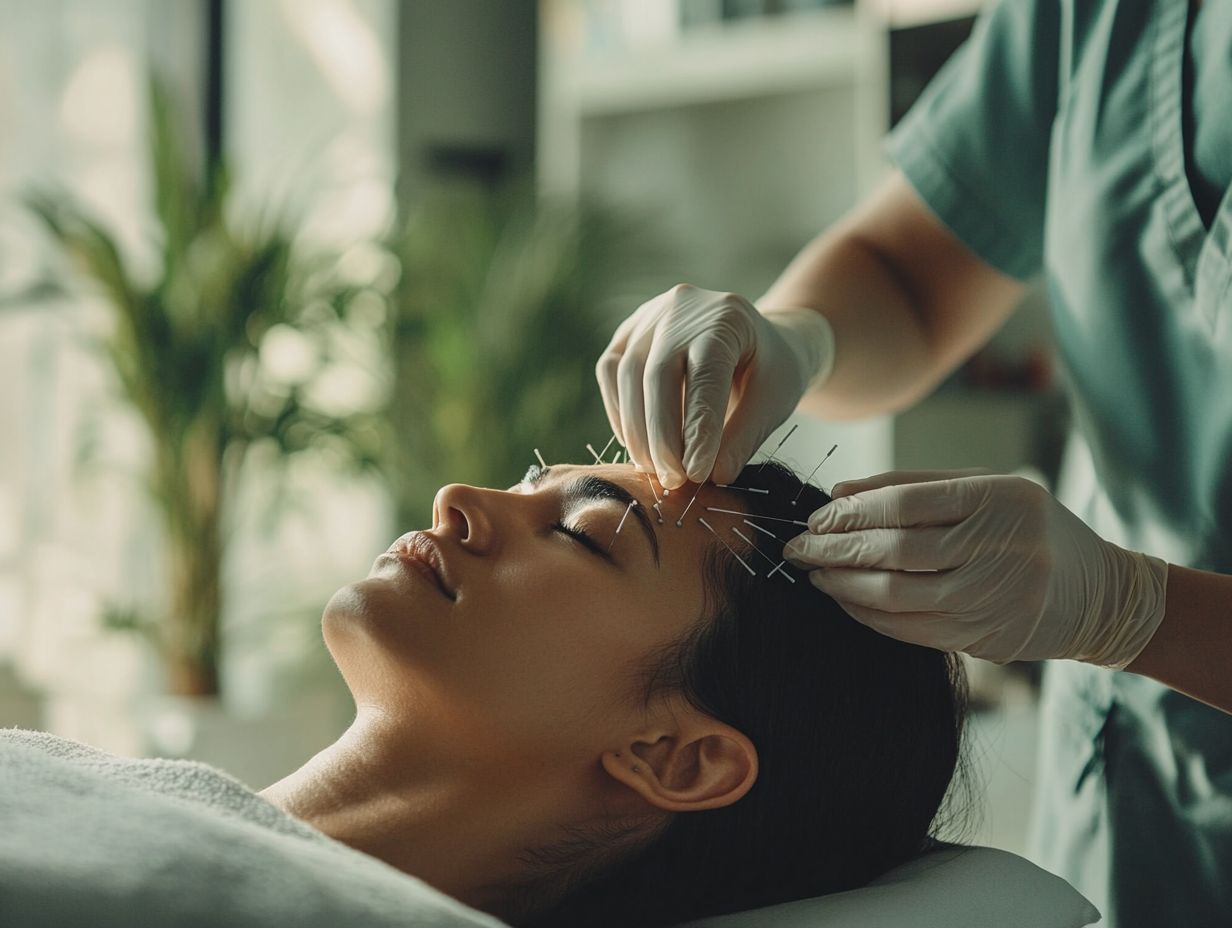
- Acupuncture has been a trusted remedy for centuries.
- It effectively reduces the frequency and severity of various headaches, including migraines and tension headaches.
- When choosing an acupuncturist, consider their qualifications and experience. Be sure to ask about potential side effects and risks.
Understanding Acupuncture
Acupuncture, a cornerstone of traditional Chinese medicine, stands as a whole-body approach refined over millennia. It seamlessly integrates principles of energy flow, acupoints, and therapeutic applications to deliver effective pain relief and foster overall wellness.
This ancient art employs fine needles skillfully inserted into specific acupuncture points to activate the body’s innate healing mechanisms. It provides not only stress relief but also enhances your overall health management.
As the allure of alternative treatments continues to rise, acupuncture has garnered recognition for its remarkable efficacy across various conditions. It positions itself as a valuable option for anyone seeking self-care and improved health outcomes.
History and Principles
The history of acupuncture spans over 2,500 years, deeply ingrained in ancient Chinese medicine and philosophy, which emphasizes the importance of balancing Qi, the vital energy that flows through your body.
Through centuries of refinement, acupuncture has blossomed into a whole-body approach that seeks to harmonize the intricate dance of your body s vital forces. This traditional method is rooted in the ancient understanding of yin and yang those opposing forces that must coexist in harmony for you to achieve optimal health.
Practitioners who embrace these principles guide therapeutic interventions designed to restore balance across your body s systems. As a cornerstone of traditional Chinese medicine, acupuncture rests on the belief that maintaining a free flow of Qi is essential for your physical, emotional, and spiritual well-being, illustrating a truly comprehensive approach to health.
How Acupuncture Can Help with Headaches
Acupuncture is gaining recognition as a highly effective complementary therapy for managing headaches and migraines. This targeted needling technique provides pain relief by addressing the underlying causes of these debilitating conditions.
By stimulating specific acupuncture points, practitioners can help alleviate headache intensity, reduce symptoms such as sensitivity to light and sound, and enhance your overall well-being if you’re struggling with chronic pain.
Additionally, this alternative treatment can serve as a valuable adjunct to conventional migraine medications, ultimately improving health outcomes for many individuals like yourself.
Types of Headaches Treated
Acupuncture treatment has demonstrated significant potential in alleviating various types of headaches, particularly migraines, tension headaches, and cluster headaches, all of which can profoundly disrupt your daily life.
Each headache type comes with its own distinct set of symptoms. For instance, migraines often manifest as intense throbbing accompanied by nausea and light sensitivity, while tension headaches might present as a dull, aching sensation encircling your forehead. Cluster headaches, on the other hand, are infamous for their excruciating, localized pain that tends to follow cyclical patterns.
The underlying causes of these headaches are diverse, ranging from stress and anxiety to hormonal fluctuations and dietary triggers.
By integrating acupuncture into your wellness routine, you can experience enhanced stress relief. This ancient practice not only helps regulate pain perception but also addresses the underlying tension contributing to these debilitating conditions.
Contact a qualified acupuncturist today to see if this treatment is right for you!
What to Expect During an Acupuncture Session
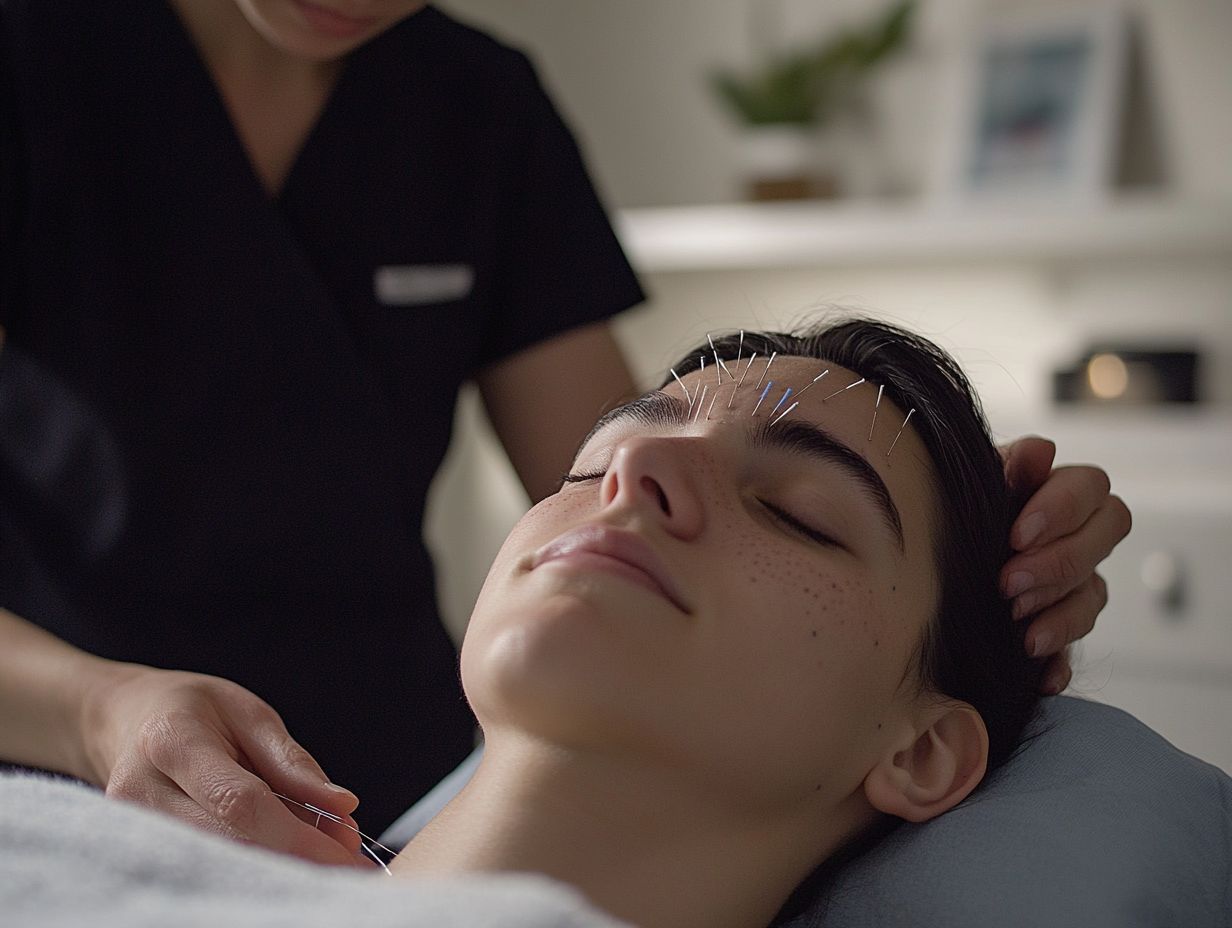
During an acupuncture session, you can expect a calm and soothing space tailored just for you. The focus is on personalized care.
This treatment involves acupuncture, which promotes pain relief and improves your health. Your session will start with a detailed assessment of your health history, helping the acupuncturist identify key points for your treatment plan.
You may also experience acupressure, which adds comfort and boosts therapeutic benefits.
The Process and Techniques Used
The acupuncture process involves carefully placing thin needles in specific points on your body. Various techniques ensure your safety and comfort while addressing pain.
Practitioners might adjust the needle depth and angle based on your body s unique needs. They create a peaceful environment to help ease any anxiety you may have.
This careful approach minimizes discomfort and aligns with traditional Chinese medicine, enhancing your body s energy flow, or Qi.
By prioritizing your safety, these methods effectively target pain relief and contribute to a greater sense of well-being.
Research and Evidence on Acupuncture for Headaches
Research shows that acupuncture is effective in managing headaches. Studies highlight its benefits as a therapeutic option for various headache types.
Systematic reviews indicate that patients who receive acupuncture see significant improvements compared to those who use standard treatments. This positions acupuncture as a valuable alternative in headache management.
Studies and Results
Many clinical trials support acupuncture as a promising treatment for headaches and migraines. This often reduces your need for medication.
One review in the Journal of Pain analyzed 29 studies with over 3,000 participants. It showed that people experienced a significant drop in the frequency and intensity of headaches after several acupuncture sessions.
These results suggest that adding acupuncture to your health plan may not just relieve headaches but also improve your overall well-being.
Choosing an Acupuncturist
Choosing the right acupuncturist is crucial for a safe and effective experience. This decision can greatly influence your treatment outcomes.
Look for licensed practitioners with the right qualifications and experience. This ensures you receive tailored medical advice.
Factors to Consider and Questions to Ask
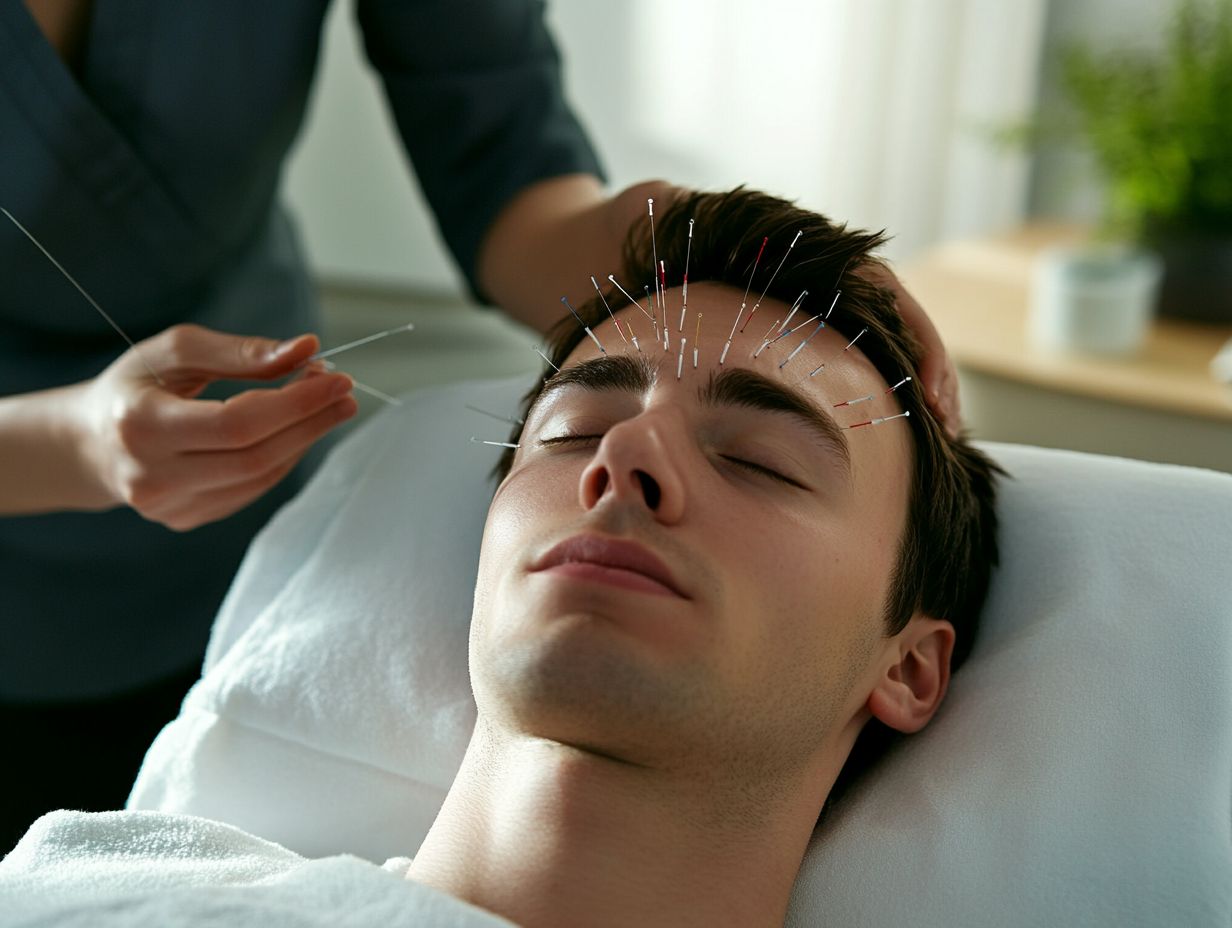
When choosing an acupuncturist, consider important factors and ask the right questions. Start by checking their qualifications and experience, as this can impact your treatment.
Ask about their techniques, as different methods work better for certain conditions. Knowing the session frequency will help set realistic expectations.
Look at past patient reviews for insights into the practitioner’s approach. This will give you more confidence in your choice.
Potential Side Effects and Risks
While acupuncture is largely regarded as a safe practice, you must be mindful of the potential side effects and risks that may accompany the treatment.
This is especially important when it comes to pain perception and ensuring your overall safety as a patient.
What to Watch Out For
Be aware of specific risks and side effects associated with acupuncture, such as minor bruising or soreness at the needling sites. Always ensure that your treatment adheres to the highest standards of patient safety.
Stay alert for other possible side effects, including dizziness, fainting, or even allergic reactions to materials used during the procedure.
Recognizing that not everyone responds the same way to this treatment can help alleviate any concerns you might have. Maintain open communication with your practitioner about any unusual symptoms you experience during or after the treatment.
Always prioritize seeking accurate medical advice when you’re uncertain about these responses. Proper guidance leads to an effective and safe acupuncture experience.
Frequently Asked Questions
What is acupuncture and how does it help with headaches?
Acupuncture is a traditional Chinese medicine practice that involves inserting thin needles into specific points of the body to stimulate energy flow. It can help relieve headaches by reducing tension, inflammation, and promoting relaxation.
Is acupuncture safe for treating headaches?
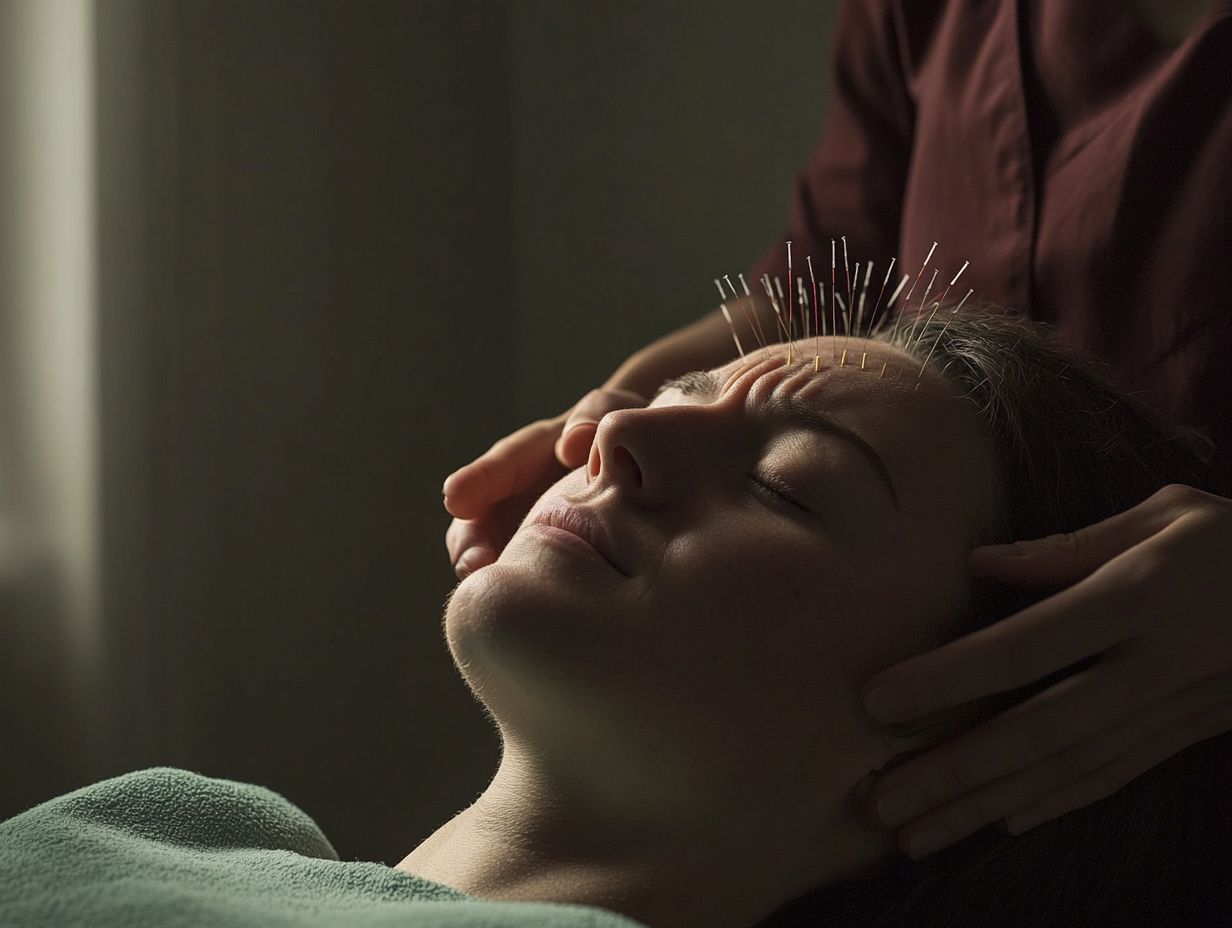
Acupuncture is generally considered safe when performed by a trained and licensed practitioner. However, it may not be suitable for everyone, and some people may experience mild side effects such as bruising, soreness, or dizziness.
Can acupuncture cure all types of headaches?
Acupuncture has been shown to be effective in treating tension headaches, migraines, and cluster headaches. However, it may not be as effective for headaches caused by other underlying medical conditions.
How long does an acupuncture session for headaches last?
The length of an acupuncture session for headaches can vary depending on the severity and type of headache. On average, a session can last anywhere from 30 minutes to an hour. Most people require multiple sessions for optimal results.
Are there any preparations or precautions I should take before an acupuncture session for headaches?
It s best to avoid eating a heavy meal or consuming alcohol before an acupuncture session. Tell your practitioner about any medical conditions, allergies, or medications you have beforehand.
Can I continue taking medication for headaches while undergoing acupuncture treatment?
Yes, you can continue taking medication for headaches while undergoing acupuncture treatment. Your practitioner may also recommend certain herbal remedies or lifestyle changes to complement your treatment plan.
Don t ignore unusual symptoms talk to your practitioner right away! If you’re interested in acupuncture, consider booking a session with a qualified practitioner now!

